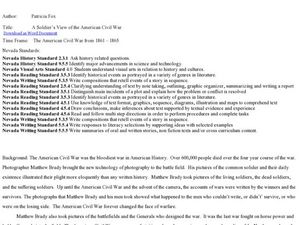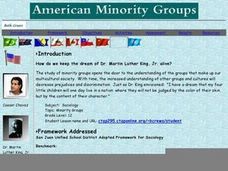Curated OER
Indentured Servitude of Native Americans in Southern New England
High schoolers explore slavery by researching Native American history. In this racial prejudice lesson, students identify the treatment of Native Americans in the New England area 200 years ago. High schoolers answer study questions...
Curated OER
People From American History
In this social studies worksheet, 4th graders will gain an understanding of nine famous Americans and their accomplishments to society. Students will complete nine fill in the blank statements about each individual.
Curated OER
A Soldier's View of the American Civil War
Study and research the American Civil War in this explanatory writing lesson. Middle schoolers complete six activities to learn about the American Civil War and soldiers' views of the war. The lesson includes several options to complete...
Curated OER
Civics Test for Citizenship: History and Government (51-100)
Use this presentation to help English learners prepare for their upcoming citizenship test. It includes questions 51-100 from the History and Government section of the exam (questions 1-50 can be found in a different presentation, linked...
DocsTeach
Twelve Years a Slave
It's difficult to truly grasp the effects of slavery. Young historians use historical analysis to understand the struggle of slavery on African Americans. The resource provides text from the autobiography Twelve Years a Slave to help...
Smithsonian Institution
Latino Expression
How much of your daily life is influenced by Latin American music? Take a listen—the answer may surprise you! High schoolers keep a journal to note any instances they see Latino culture represented, including the media, their school, and...
Marybeth Lobiecki
Beyond Baseball with Jackie Robinson
Jackie Robinson was more than a baseball star, he was a prominent activist. The thought-provoking resource focuses on the life and achievements of Jackie Robinson, from his baseball career to his civic participation. Academics listen and...
US House of Representatives
A Picture is Worth a Thousand Words
Groups select a photograph from one of the four eras of African Americans in Congress and develop a five-minute presentation that provides background information about the image as well as its historical significance. The class compares...
National Woman's History Museum
Unsung Voices: Black Women and Their Role in Women's Suffrage
Reclaim perspectives often left out of the narrative about the suffrage movement with an activity that lifts up the voices of African American women. Using primary sources and biographical details of Fannie Barrier Williams' life, young...
Smithsonian Institution
Native Resistance: Native Resistance Then and Now
Native Americans lost so much—and gained so little in return. Scholars explore Native Americans' resistance to the United States government. The lesson plan uses primary sources to explore the different forms of protest and gives a voice...
K12 Reader
Civil Rights Biography: Dr. Martin Luther King, Jr.
Why do schools and government offices close one day every January to honor the birthday of Dr. Martin Luther King, Jr.? Young learners discover the achievements and lasting significance of this influential figure in American history with...
PBS
Rosa Parks: Civil Rights Activist
Scholars examine the courageous efforts made by civil rights activist, Rosa Parks. Discussion questions and a brief writing assignment follows a short film. A photograph and a silent film delve deeper into Park's history and three...
University of California
Impact of the California Missions on Native Americans
While the Spanish claimed to bring civilization to California indigenous peoples, in reality, they also brought violence and forced assimilation to European values. Primary sources, such as the reports of Catholic priests and Europeans...
Smithsonian Institution
Borders within the United States: Indian Boarding Schools and Assimilation
Native American Nations ... sovereign entities or removable tribes? A thought-provoking instructional activity explores the relationship between Native American tribes and the United States, including forced assimilation and removal from...
Curated OER
Prisoner in One's Own Home
Examine the internment of Japanese-Americans during World War II. After reading an article from the New York Times and exploring the author's word choice, young readers find the central idea in the text and work on researching additional...
National Woman's History Museum
Breaking Through Gender Roles: The Women of NASA
Whether recognized or not, extraordinary women were integral to breaking gender barriers and putting Americans into space. For Women's History Month, explore a series of video clips and biographical information that profile these...
Curated OER
American Minority Groups
Explore the contributions individuals have made in the lives of American minority groups. Twelfth graders write a five-page expository piece providing a social history, examples of discrimination, and patterns of assimilation for an...
Smithsonian Institution
Barn Again! Celebrating an American Icon
How do barns serve as a window to a community's past? Here are a series of lessons on the symbolism and historical context of barns throughout American history. Topics include community-building, in-depth primary and secondary source...
National Endowment for the Humanities
Using Historic Digital Newspapers for National History Day
Your learners will take a trip through history as they peruse through historic digitalized newspapers, reading real articles from such historical periods in the United States as the Temperance movement and passage of the Thirteenth...
National WWII Museum
The Red Ball Express: Statistics as Historical Evidence
Historians use all kinds of information to make conclusions ... including statistics. Young scholars examine how two historians evaluate The Red Ball Express—a supply line staffed primarily by African Americans—using numbers. The...
K12 Reader
African American Freedom Fighters Word Search
An informative word search includes the names of six famous African American civil rights leaders. The list includes Rosa Parks, Sojourner Truth, Martin Luther King, Jr., Harriet Tubman, and Frederick Douglass.
Center for History Education
Guatemalan Coup of 1954: How Did the Cold War Influence American Foreign Policy Decisions?
Was it all about the bananas—or the fear of a communist threat? Young historians use a history lab to examine documents from the American-led 1954 Guatemalan coup. Using graphics, government documents, and speeches, they examine the...
Curated OER
Pocumtucks in Deerfield
As part of a study of colonial and Native American history, class members focus on the beliefs and land use of the Pocumtucks, who settled near Deerfield, Massachusetts. Students examine their beliefs about land use and ownership, the...
National Endowment for the Humanities
Mark Twain and American Humor
“The Celebrated Jumping Frog of Calaveras County” is famous, in part, because it established a uniquely American form of humor. For this famous story, Mark Twain combines the tall-tale, the dialect story, and satire. Here is a resource...
Other popular searches
- Native American History
- South American History
- African American History
- History of American Women
- Central American History
- Ancient American Cultures
- African+american+history
- 1800s American History
- 1700s American History
- African American History
- Early American History
- African American History Month

























